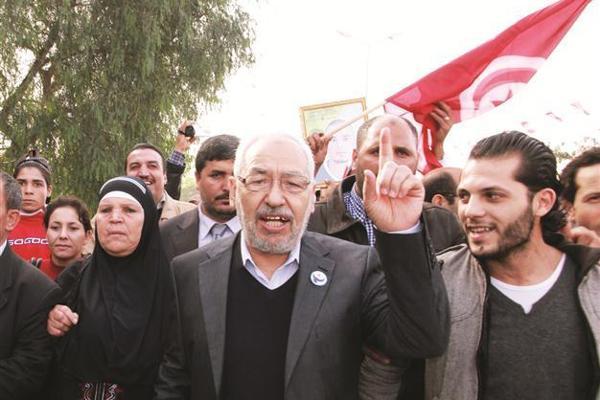No need for secularism in Tunisia: Ghannouchi
İpek Yezdani ISTANBUL


The head of the Tunisian Islamist movement Ghannouchi arrives at the former National Assembly near Tunis, Nov 22. Ghannouchi (L) met PM Erdogan in İstanbul. AP photo
The closest example to the Tunisian experience is Turkey but Tunisia does not need secularism, the leader of the Tunisian Islamist Ennahda party Rached Ghannouchi said in a recent interview with Hürriyet Daily News.“We need democracy and development in Tunisia and we strongly believe in the compatibility between Islam and democracy, between Islam and modernity. So we do not need secularism in Tunisia,” Ghannouchi said in an interview Dec. 23.
After forming the new Cabinet in Tunisia two months after the country’s first free elections, Ghannouchi visited Turkish Prime Minister Recep Tayyip Erdoğan in the Prime Minister’s Office in Istanbul Dec. 23.
After a meeting with Erdoğan lasting an hour and a half, Ghannouchi said, “We expect many things from Turkey. We expect our relations will strengthen and cooperation will increase for the common interests of both countries, because we believe the closest experience to Tunisia is Turkish experience. We share many common elements and we expect our cooperation will develop in all fields.”
They also talked about the “main problems of the Muslim world,” Ghannouchi said. “Like what happened in Syria, in Libya, in Egypt, etcetera. and in the other countries where there are problems. We share many ideas on those issues.”
Regarding secularism, “There are some different contexts between Tunisia and Turkey in this field. We respect the choices of our friends in Turkey and they respect ours,” Ghannouchi said. Erdoğan’s message during his speech in Tunisia did not involve secularism, she added. “Erdoğan has not talked about secularism in Tunisia; he talked about secularism in Egypt.”
Ghannouchi also referred to the concerns over a radical Islamist sect called the “Salafis” in Tunisia. “Salafis in Tunisia is a new phenomenon. They do not express themselves in politics and they are minorities. They are part of our nation, they are citizens and they have the full right to express themselves as long as they do not use violence,” Ghannouchi said.
‘I guarantee women’s rights’
Ghannouchi refused claims there are concerns amongst some Tunisian women about losing their previously gained rights. “Most of Tunisian women are convinced Nahda does not constitute any threat to their rights. Out of 49 women in the Tunisian assembly, 42 of them are Nahda members. So Tunisian women believe Nahda does not form any threat to their rights; I guarantee their rights,” Ghannouchi said.
Ghannouchi said from now on their main aim would be realizing the goals of the revolution in Tunisia.
Tunisia’s Prime Minister Hamadi Jebali unveiled his new Cabinet Dec. 22, two months after the country’s first free elections, and vowed to make job creation and reparations to victims of the ousted regime among his key priorities.
The creation of a new government is a major milestone in Tunisia, following the popular revolt against Ben Ali that began in December 2010, and triggered what became known as the Arab spring; a series of uprisings across the Arab world that led to the overthrow of several veteran dictators.
